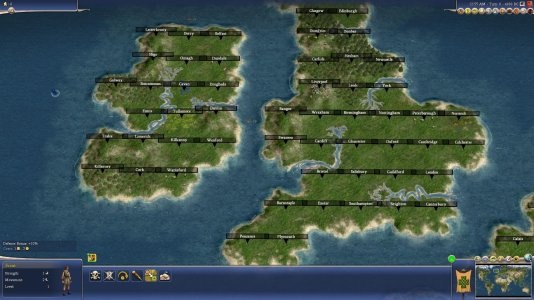1) Victories have a disproportionate influence in shaping gameplay experience. If you make the player win through some late game goal, then from turn one they'll be incentivized to think about how they're gonna maximize their odds of winning like that. And as previously said, that tends to homogenize playthroughs, since to be in the best position to accomplish some ambitious, late term goal, being the most powerful player puts you in the best position. This also makes for a less immersive experience, since it feels like rulers would care about concerns that are positively short term compared to the throusand years-lifespan proposed by Civ. RFC has UHVs that are timed to represent the highs of their Civ - I'm not sure what would be the more freeform equivalent, but maybe some sort of themed achievement system, "be the first to do X", "increase your score in Y". It's tricky because you'd have to make the player compete against themself more than they do against the AI.
4) Large empires should be beneficial in the short term, but hard to maintain. Most of the larger real life empires were pretty short-lived in the grand scheme of things. Some of the most memorable ones fell apart within a generation. Problem is, from the long term perspective of a Civ player that's suboptimal: you mostly want to always keep growing in a sustainable way. This is why I think you'd need to the player to think in the short term like the conqueror they emulate, by having fast expansion gives them something interesting that they can discard afterwards. RFC does this with UHVs + spawns and instability eating away at your hard won empire. This could again be part of some achievement system, or be of direct strategic importance, such as colonial resources that would be very useful at precisely one stage of the game.
This is where I'll defend Humankind a little bit, at least one of it's core concepts in theory. In that game, there are six eras to progress through, each of which presents the player with opportunities to earn Fame, the win condition. You can earn more Fame through expanding your empire, making more money, killing enemy combatants, growing your population, etc. Now, I believe Humankind was designed first and foremost as a 4X game, and as a "historical game" second, which is fine for what it is, IMO. That is, more is better, and you should try to snowball as much as possible, and historical units and civilizations present the outward dressing, so to speak.
But, you can see how this basic mechanic of Fame presents an opportunity for these sort of "short term goals" to happen organically during an unscripted 4X game (at least in theory, with a few adjustments to game mechanics. Humankind isn't exactly designed like this at the moment.) For example, maybe you can earn a lot of fame for conquering and expanding your empire to 10 territories during the classical era... But the instability is too much to handle, so you are forced to split your empire in half immediately after achieving it. Or you can earn a ton of fame for producing 10,000 gold during the Renaissance era, so you sail out and monopolize the rich trade routes... But now other empires are eyeing your treasury with greedy eyes, and start raiding your trade routes. Or you put all your workers into farmers to grow your population to 100 citizens to earn more fame... But doing so leaves you open to foreign invasion, or more susceptible to the plague. Additionally, maybe achieving these goals gives the player even more Fame the faster they manage to achieve them, thus encouraging a more reckless playstyle as the player frantically throws long term considerations to the side in order to complete this short term goal as quickly as possible, to get closer to victory. An inverse relationship between long term stability and winning the game.
Anyways, like I said, Humankind isn't exactly designed like that, it's designed as a 4X game, where more eXpanding and eXtermination is better than fewer. But this idea of tying the win condition, Fame, to short term goals which ultimately hurt your long term prospects has a lot of potential, IMO. Earning Fame is the rise, and the consequences of that is the fall, if you will. The idea of balancing your empire's long term stability and playing it safe... and deciding when to go for broke, and go all in in some regard in order to get closer to a win condition. IMO that has a lot of potential for replayability, and better mimicking our history in unscripted playthroughs.


